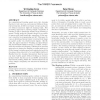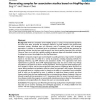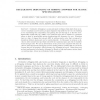548 search results - page 75 / 110 » Liberate Computer User from Programming |
125
click to vote
KCAP
2009
ACM
15 years 8 months ago
2009
ACM
As computational learning agents move into domains that incur real costs (e.g., autonomous driving or financial investment), it will be necessary to learn good policies without n...
133
Voted
ICDCS
2012
IEEE
13 years 4 months ago
2012
IEEE
Abstract—Modern day enterprises have a large IT infrastructure comprising thousands of applications running on servers housed in tens of data centers geographically spread out. T...
122
click to vote
MM
2006
ACM
15 years 8 months ago
2006
ACM
We present “equiveillance” as a conceptual framework for understanding the balance between surveillance and sousveillance. In addition to this conceptual framework we also pre...
125
click to vote
BMCBI
2008
15 years 2 months ago
2008
Background: With the completion of the HapMap project, a variety of computational algorithms and tools have been proposed for haplotype inference, tag SNP selection and genome-wid...
139
click to vote
RTA
2010
Springer
15 years 6 months ago
2010
Springer
Abstract. Declarative debugging is a semi-automatic technique that starts from an incorrect computation and locates a program fragment responsible for the error by building a tree ...



